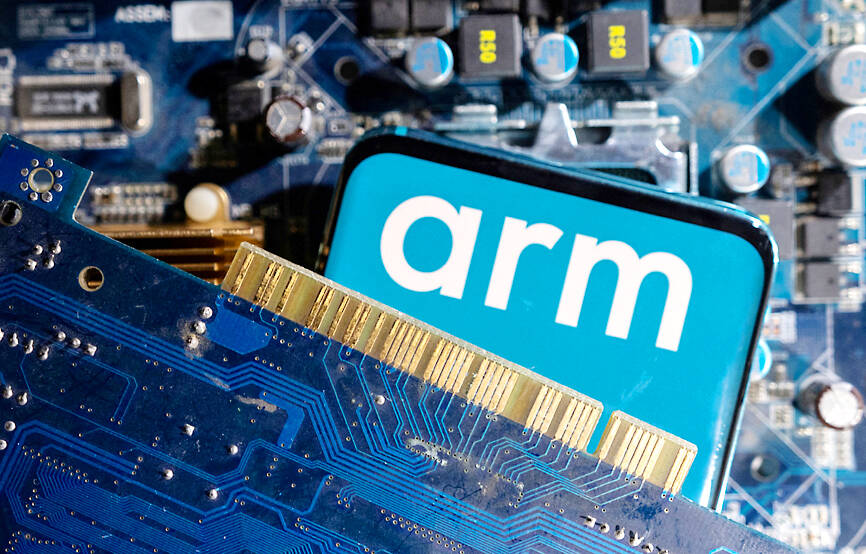Arm Ltd, a chip designer that is preparing for what would be the biggest initial public offering (IPO) this year, saw its revenue decline about 1 percent in the most recent fiscal year, according to a draft filing for its IPO reviewed by Bloomberg.
Companies often look to post rising revenue in the periods leading up to stock sales, but Arm’s sales fell to US$2.68 billion in the 12 months ended on March 31, according to the filing, which is still subject to change. Japan’s Softbank Group Corp, which owns Arm, plans an IPO of the company as soon as next month that could value the chip designer at as much as US$70 billion.
Arm’s draft F-1 filing is based on US accounting rules as the company prepares to list on NASDAQ. In May, Softbank said sales at the unit had grown 5.7 percent in the latest fiscal year under international standards.

Photo: Reuters
US accounting rules and International Financial Reporting Standards (IFRS) have separate thresholds for when revenue can be recognized.
The overall chip industry is still emerging from a sales slump triggered by a buildup of excess inventory, especially in the smartphone market — a central focus for Arm. Qualcomm Inc, one of Arm’s biggest partners, gave a disappointing forecast for the latest quarter earlier this month, sending its shares tumbling. And even Apple Inc’s prized iPhone has seen demand slow.
Arm’s draft filing shows sales for the quarter ended June 30 fell 2.5 percent to US$675 million under US standards. That is a smaller drop than Softbank reported earlier this month, when it said sales for the unit fell about 11 percent to US$641 million under IFRS.
Arm designs technology including microprocessors, and its intellectual property is used in just about every smartphone in the world. It was publicly traded until 2016, when Softbank bought it for around US$32 billion. The Japanese conglomerate said in 2020 that it was selling the company to Nvidia Corp for US$40 billion, but regulatory pressure forced Nvidia to abandon its bid last year. Arm said in April it had made a confidential filing for a US IPO.
The filing could be made public as early today, people familiar with the matter said. Arm is expected to sell about 10 percent of the company’s shares in the listing.
A representative for Arm declined to comment.

KEEPING UP: The acquisition of a cleanroom in Taiwan would enable Micron to increase production in a market where demand continues to outpace supply, a Micron official said Micron Technology Inc has signed a letter of intent to buy a fabrication site in Taiwan from Powerchip Semiconductor Manufacturing Corp (力積電) for US$1.8 billion to expand its production of memory chips. Micron would take control of the P5 site in Miaoli County’s Tongluo Township (銅鑼) and plans to ramp up DRAM production in phases after the transaction closes in the second quarter, the company said in a statement on Saturday. The acquisition includes an existing 12 inch fab cleanroom of 27,871m2 and would further position Micron to address growing global demand for memory solutions, the company said. Micron expects the transaction to

Vincent Wei led fellow Singaporean farmers around an empty Malaysian plot, laying out plans for a greenhouse and rows of leafy vegetables. What he pitched was not just space for crops, but a lifeline for growers struggling to make ends meet in a city-state with high prices and little vacant land. The future agriculture hub is part of a joint special economic zone launched last year by the two neighbors, expected to cost US$123 million and produce 10,000 tonnes of fresh produce annually. It is attracting Singaporean farmers with promises of cheaper land, labor and energy just over the border.

US actor Matthew McConaughey has filed recordings of his image and voice with US patent authorities to protect them from unauthorized usage by artificial intelligence (AI) platforms, a representative said earlier this week. Several video clips and audio recordings were registered by the commercial arm of the Just Keep Livin’ Foundation, a non-profit created by the Oscar-winning actor and his wife, Camila, according to the US Patent and Trademark Office database. Many artists are increasingly concerned about the uncontrolled use of their image via generative AI since the rollout of ChatGPT and other AI-powered tools. Several US states have adopted

A proposed billionaires’ tax in California has ignited a political uproar in Silicon Valley, with tech titans threatening to leave the state while California Governor Gavin Newsom of the Democratic Party maneuvers to defeat a levy that he fears would lead to an exodus of wealth. A technology mecca, California has more billionaires than any other US state — a few hundred, by some estimates. About half its personal income tax revenue, a financial backbone in the nearly US$350 billion budget, comes from the top 1 percent of earners. A large healthcare union is attempting to place a proposal before